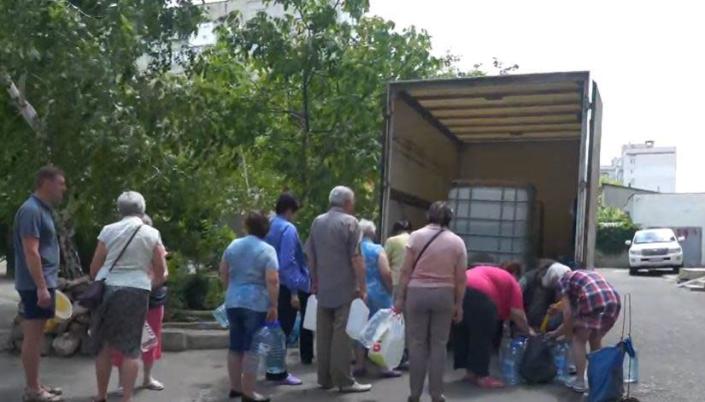Mykolaiv, Ukraine — Ukrainian President Volodymyr Zelenskyy said Wednesday night that Russia’s naval blockade of his country’s southern ports could lead to starvation for millions of people around the world. CBS News correspondent Chris Livesay visited Odesa this week, where some 20 million tons of wheat and corn are sitting idle, ready to leave the port but blocked by Russian warships and mines.
The top official in the neighboring Mykolaiv region — home to another key port that Russia has been hammering with artillery for weeks — said Vladimir Putin’s military is attacking food in a bid to scare the world into reopening the Black Sea to shipping.
Mykolaiv governor Vitaliy Kim said Moscow wanted to make world food shortages “look like a catastrophe… because they are trying to trade about opening the Black Sea.”
Ukraine‘s government has urged world leaders negotiating over a possible deal to reopen the shipping lanes not to trust any promises from Russia of safe passage for vessels. Zelenskyy and his aides believe Moscow could use any agreement on a sea corridor as leverage to seek relief from the myriad sanctions Russia has been hit with since it launched the invasion on February 24.
But Ukrainian officials also fear that if Black Sea traffic does start moving again, it could give Russia much easier access to cities it has been desperate to capture for weeks, including Odesa, and Mykolaiv further to the east.
Russia recently struck a major agricultural facility in Mykolaiv, where Livesay met charity workers who’ve been risking their lives daily to save others.
Residents in and around Mykolaiv must brave Russian bombs if they want to eat or drink. During an air raid, it’s a question of life or death: Risk being hit by Russian shells — or hunker down and go hungry.


Russia’s forces have attacked both the food and water supply, forcing the people of Mykolaiv to line up for rations of both. “I’m looking after two grandmothers, one 89, the other 97,” Natalia told Livesay. “They’re too afraid to leave the house.” That’s where the World Central Kitchen organization comes in. The charity has been cooking hot meals and delivering them to civilians, soldiers, and even Russian prisoners of war — no matter the risk. And the risks are real, and ever present.
Ivan, one of the World Central Kitchen volunteers, told CBS News he recently heard the “loud boom” of a cluster bomb as he drove through the city in the van he uses to deliver meals. There’s now a hole in the roof of his van, over the passenger seat, that he said was caused by shrapnel from that bomb.
Russian warships and mines are blocking Ukraine’s ports, holding hostage the huge amount of grain that had been earmarked for the developing world. As CBS News has reported, that’s exacerbating the global food crisis. But there’s also a local food crisis. About 45% of Ukrainians are struggling to find enough to eat right now, according to the World Food Program. That’s because wheat fields have become minefields, and when farmers try to work, they risk getting blown off their tractors by Russian rockets. That’s what happened to Sergei, who’d just got out of surgery when Livesay met him. Shrapnel tore through his lung and liver, and narrowly missed his heart.


“For attacking civilians,” he said, “they’re bastards.”
If Mykolaiv falls to Russian forces, there will be little stopping them from capturing Odesa and, with it, Ukraine’s entire Black Sea coast.
The city’s mayor has said their last hope is the advanced weapons systems currently on their way from the U.S. — if they arrive in time.
House Select Committee investigating Jan. 6 attack holds first televised public hearing tonight
Jan. 6 House select committee holds first of several public hearings tonight for primetime




